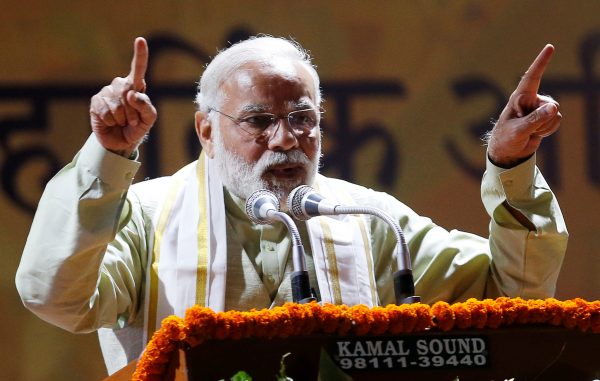And the strength of BJP’s showing across the other states up for grabs this time round was a massive personal triumph for Modi, who played a central role in the campaigning.
These elections could prove a watershed as important as any in Europe in the push-back against globalisation if Modi chooses to use his new political capital to press on bravely with his economic reform agenda.
It’s an important win for Modi, who appeared to be losing political momentum a little over half-way through his national parliamentary five-year term. These elections are akin to the US mid-term elections and the scale of the shift to BJP and the disarray in the main opposition Congress Party leave Modi sitting pretty for the national general election in 2019.
The huge moral victory for Modi delivered increased authority within his party (where internal dissent is now almost unhealthily absent) and new influence across the country. Modi’s charisma and drive are at the heart of BJP’s ascendancy. But it’s a victory of direct and practical political value as well.
Of Uttar Pradesh’s 403 state legislators, 312 represent the BJP. BJP took over 40 per cent of the vote which, because of the first-past-the-post voting system, translated into 77 per cent of seats in the UP state assembly. They, like BJP majorities in other states across the country, have an important indirect say in how the Rajya Sabha (the national parliament’s upper house) stacks up. State parliamentarians vote in indirect elections for both the national upper house and for India’s presidency, a position that falls vacant in July.
The Rajya Sabha has been a check on the BJP’s control of the central government. While its membership will change only slowly, which is why opposition parties still hold a majority, with the BJP now running 13 of India’s 29 states, including some of the biggest, it’s just a matter of time before the Rajya Sabha falls to BJP domination. Although Indian heads of state play a largely ceremonial role, the presidency also carries prestige and political privilege and Modi, come July, will be able to choose who holds it.
If India is to push forward with bipartisan economic reforms and open up its economy, Modi’s political dominance appears critical.
As Rajiv Kumar points out: ‘By 2046, India needs to have successfully generated a sufficient number of jobs for its young population and established a pluralistic society with a truly federal polity — a breathtaking prospect of successful triple transition‘. ‘The portents are good,’ says Kumar, ‘that Modi will not let this historical opportunity go to waste’.
Yet to some, even those who strongly back Modi’s reformist agenda, BJP’s new dominance appears more alarming than reassuring. The appointment of Yogi Adityanath, a five-term member of India’s national parliament, who’s publicly called for the execution of Muslims, as chief minister of Uttar Pradesh is not a good omen. Arun Swamy suggests that ‘Adityanath’s appointment seems to be a massive bet that the way to victory in 2019 is to do whatever is necessary to consolidate anti-Muslim sentiment among Hindus in order to overcome their own divisions along caste lines’
While Modi himself is circumspect, his party harbours many chauvinistic Hindus, who view India’s large Muslim minority with suspicion and hostility. BJP did not field a single Muslim candidate in Uttar Pradesh, where 19 per cent of the population is Muslim. Modi has done very little to stifle the growing culture of intolerance in India, not just towards Muslims, but others who are uncomfortable with BJP prickly nationalism.
BJP’s electoral triumph is all the more remarkable because Modi and the party brought it off in the wake of turmoil and controversy after the government’s poorly handled cancellation of India’s larger denomination banknotes. That was a move designed to hurt tax avoiders and corruption peddlers in the cash economy by bringing the ‘black’ economy back onto the books. Around 86 per cent of cash in the Indian economy was made worthless. ‘Demonetisation’ resulted in commercial chaos for ordinary Indians.
That the Indian public accepted the considerable pain of a measure to support action against tax evasion suggests that society was ready to move on to a system where paying a fair share of taxes is the accepted norm. The remarkable gamble seems to have paid off and delivered electoral alchemy.
On the one hand, this month’s election results give huge encouragement to India’s business community, capital markets and even foreign investor sentiment. They should also give strength to a prime minister who seems keen to press on with negotiating India’s openness to competition in global markets. Modi is intent on dismantling the barriers and state intervention that continue to keep India’s growth back despite its good but under-potential performance in recent years.
Modi has already won parliamentary approval for a nationwide sales tax to replace India’s jumble of local taxes. The administration of India’s welfare schemes is on the way up. Demonetisation at least demonstrated Modi’s capacity to act boldly to fix the Indian economy. He’s on the cusp of taking India forward in regional trade negotiations and positioned to take a global stance on globalisation. Modi now has powerful political and moral tailwinds behind his making the tough economic policy choices that India needs.
On the other hand, there’s the danger that Modi might be tempted to squander his new political capital on fighting India’s culture wars, which appears to have delivered electoral advantage, rather than entrenching India’s economy on a course of sustained and permanent growth.
Modi has an extraordinary opportunity to make the wiser choice.
The EAF Editorial Group is comprised of Peter Drysdale, Shiro Armstrong, Ben Ascione, Ryan Manuel, Amy King and Jillian Mowbray-Tsutsumi and is located in the Crawford School of Public Policy in the ANU College of Asia and the Pacific.

